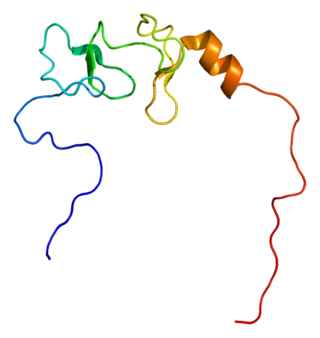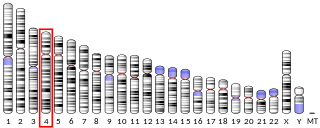
Keratin, type II cytoskeletal 7 also known as cytokeratin-7 (CK-7) or keratin-7 (K7) or sarcolectin (SCL) is a protein that in humans is encoded by the KRT7 gene. Keratin 7 is a type II keratin. It is specifically expressed in the simple epithelia lining the cavities of the internal organs and in the gland ducts and blood vessels.

Keratin 6A is one of the 27 different type II keratins expressed in humans. Keratin 6A was the first type II keratin sequence determined. Analysis of the sequence of this keratin together with that of the first type I keratin led to the discovery of the four helical domains in the central rod of keratins. In humans Keratin 6A is encoded by the KRT6A gene.

Keratin, type I cytoskeletal 4 also known as cytokeratin-4 (CK-4) or keratin-4 (K4) is a protein that in humans is encoded by the KRT4 gene.

Keratin 14 is a member of the type I keratin family of intermediate filament proteins. Keratin 14 was the first type I keratin sequence determined. Keratin 14 is also known as cytokeratin-14 (CK-14) or keratin-14 (KRT14). In humans it is encoded by the KRT14 gene.

Keratin 13 is a protein that in humans is encoded by the KRT13 gene.

Keratin, type I cytoskeletal 10 also known as cytokeratin-10 (CK-10) or keratin-10 (K10) is a protein that in humans is encoded by the KRT10 gene. Keratin 10 is a type I keratin.

Keratin 9 is a protein that in humans is encoded by the KRT9 gene.

Keratin, type I cytoskeletal 19 (Keratin-19)) also known as cytokeratin-19 (CK-19) is a 40 kDa protein that in humans is encoded by the KRT19 gene. Keratin-19 is a type I keratin.

Keratin 18 is a type I cytokeratin. It is, together with its filament partner keratin 8, perhaps the most commonly found products of the intermediate filament gene family. They are expressed in single layer epithelial tissues of the body. Mutations in this gene have been linked to cryptogenic cirrhosis. Two transcript variants encoding the same protein have been found for this gene.

Keratin 15 is a protein that in humans is encoded by the KRT15 gene. It has also been referred to as cytokeratin 15, K1CO and KRTB.

Keratin, type II cytoskeletal 8 also known as cytokeratin-8 (CK-8) or keratin-8 (K8) is a keratin protein that is encoded in humans by the KRT8 gene. It is often paired with keratin 18.

Periplakin is a protein that in humans is encoded by the PPL gene.

F-actin-capping protein subunit alpha-1 is a protein that in humans is encoded by the CAPZA1 gene.

LIM domain and actin-binding protein 1 is a protein that in humans is encoded by the LIMA1 gene.

Neurabin-1 is a protein that in humans is encoded by the PPP1R9A gene.

WD repeat-containing protein 1 is a protein that in humans is encoded by the WDR1 gene.

Keratin, type II cytoskeletal 78 is a protein that in humans is encoded by the KRT78 gene.

Keratin, type I cuticular Ha4 is a protein that in humans is encoded by the KRT34 gene.

Keratin, type I cuticular Ha6 is a protein that in humans is encoded by the KRT36 gene.

Keratin 79 also known as KRT79 is a protein which humans is encoded by the KRT79 gene.











